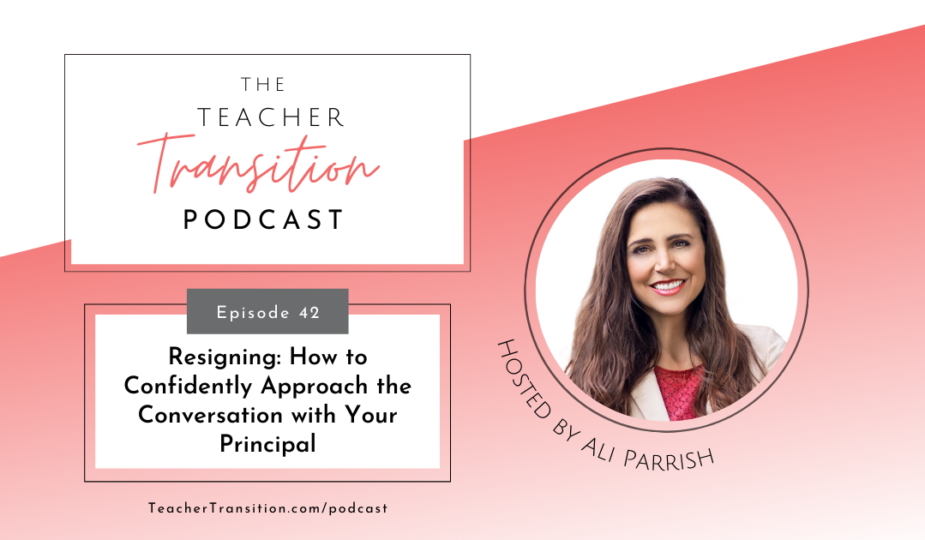Resigning: How to Confidently Approach the Conversation with Your Principal
The Show Notes
Many teachers who are considering a transition have been in education for years. Sometimes that makes it more difficult to stay because your investment runs so deep. In this case, it is very natural for the decision regarding resigning to be very difficult.
If you’re struggling with feelings of guilt and fear of disappointing students, parents, or colleagues, it’s time to challenge those thoughts. There’s a way to resign with confidence and honor the investment you made. In this episode, you’ll find how to do just that.
Counting the Cost
Many teachers who are considering a transition have been in education for years. Sometimes that makes it more difficult to stay because your investment runs so deep. Your relationships with students, parents, colleagues and the community have become so significant. In this case, it is very natural for the decision to leave to be very difficult.
But if your gut is telling you it’s time to advance, it’s not going to be something you can ignore. So how do you sift through all the emotions like guilt and grief that come with making this decision? It’s a really important process that you don’t want to skip. If you try to, you run the risk of your resignation conversation leaving a negative impression.
Why You Need to Prepare for The Resignation Conversation
If you listened to episode 29 with Bonnie Moore, you already have some great tips for how to quit with class. You want to be thoughtful about how you navigate this conversation with your principal for a few reasons.
For one, you want to exit with a sense of integrity and respect. You’ve invested a lot of your time and energy into this role. It’s important for you and your principal to honor that.
Next, you never want to burn any bridges on this journey. You might never return to the classroom. But you might find that your relationships with old colleagues or families are helpful for references or networking opportunities for the future.
Perhaps most importantly, you want to do the work of sifting through these emotions so that you can have a sense of peace and confidence when you have this conversation. When we don’t deal with hard emotions like guilt and shame, it can make it hard to communicate clearly.
Resigning and deciding to leave the classroom is a decision you should be proud of yourself for. If you are thoughtful and intentional in your approach, you are inviting others to celebrate this move with you.
Naming the Emotions Around Resigning
Guilt can be an emotion teachers struggle with when they want to advance. There may be parents who were so excited to have their child in your classroom next year. That can feel really hard. But I challenge you to consider something. When you resign, you are actually creating an opportunity for someone else who is also anxious to impact the lives of students – just like you did.
You could also be facing feelings of guilt about resigning if you hold important roles at your school like committee chair or department lead. You were likely doing an incredible job that was really valued. But again, I want you to consider, what opportunity might be opening up for a colleague who wants to grow in new ways? Your decision to leave might be an answer to their prayers!
Lastly, the thought of leaving behind important relationships could feel really overwhelming. You don’t want colleagues, parents, or students to feel abandoned by you. This is a really amazing opportunity to do something you might have done as often as you hoped to.
As you reflect on the memories and value of these relationships, make time to have conversations or write notes to these people. Let them know how much they impacted you. When you take time to express appreciation for these people, it honors both of you in a special way.
Challenging Your Thoughts
I know that working through these emotions can be really messy. But even the fact that you have these emotions shows that teaching was not just a job. So be gentle with yourself, but commit to doing this hard work.
Carve out some time and grab a treat. Then open up a blank page of a journal and make a good ‘ol t-chart again. On the left, write out your emotions. On the right, write out the underlying assumption of those emotions.
Then take a moment to sit with what you wrote down. Are these things true? Find ways to challenge those feelings. If you’re feeling stuck in this process, then reach out to process with a community like ours who knows what it’s like. You can make this transition with grace and confidence, and we are here to help you do just that.
Could you use the extra support in taking the next step after the classroom?
Join the membership!
If you enjoyed this episode I invite you to take a screenshot and tag me on your Instagram stories @teachertransition and tell me your biggest takeaway!
Did you miss the Teacher Transition Summit?
Teaching can be a great springboard into other new jobs and roles…. but you have to know how to make it happen.
Grab access to all the amazing resources before they’re not available anymore!
The skills and experience you already have qualify you for so many opportunities!
Resources Mentioned in the Show
Wondering whether you’d enjoy being a trainer or an instructional designer? take the quiz to see which role you’d prefer!
- Join the Teacher Transition Membership!
- Teacher Transition on Facebook
- Teacher Transition on Instagram
- Become an Instructional Designer in 6 weeks!
